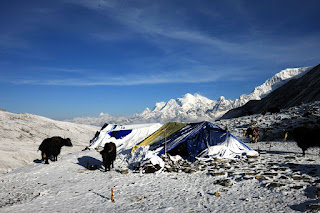Room #718B at the Rotary Convention Hall in Toronto, Canada
that seats 550 will this day miss one speaker from a little known country in
the Great Eastern Himalayas - Rotarian Yeshey Dorji, Rotary Club of Thimphu’s
Secretary Extraordinary and Plenipotentiary. My Canadian Visa never came
through and thus I could not make the trip. Perhaps the Canuks think I am some kind of thug whom they have decided to
declare persona non grata. In not
issuing me the Visa in time, the Canadians have denied me the rare honor of
being the first Bhutanese ever to speak during a Rotary Convention where
anywhere from 30,000 - 70,000 delegates from over 200 countries would congregate.
 |
| Image courtesy of RID 5370 |
I was supposed to speak during one of the Break-out Sessions of the Rotary International’s 2018 Annual Convention that began in Toronto, Canada a few days back. Fifth among six speakers on the topic “Safe Water, a Basic Human Right”, I was supposed to speak on “The Bhutan Experience: what has been done, what will be done - the partnership with Government - the need for safe water".
Well it does not matter - I am expendable. The cause is not. And the cause will see the light of day today – a momentous day for Bhutan and the Bhutanese children. Last of the Break-out Session speakers on this day in Room #718B - David Langworthy, CEO and Founder of Disaster Aid Australia (DAA) - will officially roll out the “BHUTAN 2020” initiative during this Break-out Session.
BHUTAN 2020 is an initiative underwritten by Disaster Aid
Australia, in partnership with the Rotary Club of Thimphu, Ministry of
Education and Ministry of Health, Royal Government of Bhutan. This initiative
aims at delivering 120 SkyHydrant Water Filter Systems to 120 of Bhutan’s
central schools by the year 2020. In the second phase, if things work out well
and should the partnership endure, the initiative’s coverage will extend to
every school in the country – representing 80% of Bhutanese children.
 |
| Map showing installation sites of 20 SkyHydrant water filters by July 2018. Ten of the twenty Dzongkhags would have been covered. |
This is a colossal project that requires dedication
and tireless hard work from all collaborating partners. An initiative at this
scale is something that not even the government had dared attempt so far. The initial
funding for the first phase of 120 central schools by 2020 is pegged at a staggering $1
million. I am a little jittery about this – but CEO David Langworthy assures me
that the deal is, for all practical purposes, firmly in the pocket! The man
should know.
On the part of the DAA, they have already begun work
on this initiative in right earnest. Of the 120 systems targeted, 10 of them
are already scheduled to arrive Bhutan next month, accompanied by two DAA DART
Members, a water engineer and a videographer. They will train local
installation team to handle site assessment, installation and maintenance of
the systems.
Even more interesting, I am told by DAA that they
will be featured on a Global Christmas Carol TV program that will be broadcast
in December, 2018 - to an audience in excess of 1 billion viewers worldwide!
Our BHUTAN 2020 Initiative will be featured in that broadcast.
On the part of the Ministry of Education and the
Ministry of Health, they are scheduling a training
program for 60 of the school Water, Sanitation and Hygiene (WASH)
Caretakers around the country, including few professional engineers in their
employ. The training is timed to coincide with the arrival of the DAA team from
Australia. The WASH Caretakers will be trained by the DAA DART Members – in
site assessment and maintenance of the systems, once installed, while the
engineers will take on the installation task.
The Rotary Club of Thimphu and the Kingdom of GNH are
going places! And I, your faithful man Friday, is experiencing bouts of
Atychiphobia. Because I get this feeling that the enormity of the enterprise is
still outside and beyond the fathoming of most people involved in this
endeavor.
THANK YOU
When I proposed to our Club Members that we invite
CEO David Langworthy to Bhutan to look at the schools that he is supporting, I
never imagined that the visit would culminate into this colossal project. Now
that it has, I must remember to thank the following who played a part that lead
a rank outsider to dream up, commit and implement a project that will touch the
lives of tens of thousands of children across the country.
Druk Air
Corporation, our national flag
carrier --- they have always been forthcoming to our requests for carriage of
the water filters on board their aircraft – free of cartage charges.
Drubchhu
Resort, my preferred hotel of choice
in Punakha – for providing free accommodation and meals, during the visit of
the CEO to Punakha.
Principals of Damphu
Central School, Lobesa Lower Secondary School and Dashiding Middle Secondary School – for the cultural programs and
invitation to meals, during the CEO’s visit to their schools to inspect the installations.
The
Minister, Secretary, Director General and Chief Aum Jamyang Choeden – for
rolling out the welcome wagon to the CEO. I believe that it was during the
farewell dinner in Druk Hotel hosted by the Rotary Club of Thimphu in honor of
the CEO that the idea of BHUTAN2020 began to ovulate.
DAA DART Member
Andrew Gunn – for scoring a perfect 6’er when he batted for Bhutan (a light hearted banter between Andrew and me) upon his return
to Australia after his first visit. Please keep batting!
Last but not the least, Rotarian K K Looi of Malaysia who first brought the much coveted
filter to our attention – rest is history.
Thank you all.











